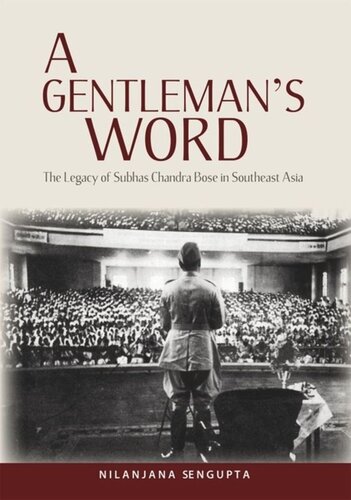

Most ebook files are in PDF format, so you can easily read them using various software such as Foxit Reader or directly on the Google Chrome browser.
Some ebook files are released by publishers in other formats such as .awz, .mobi, .epub, .fb2, etc. You may need to install specific software to read these formats on mobile/PC, such as Calibre.
Please read the tutorial at this link: https://ebookbell.com/faq
We offer FREE conversion to the popular formats you request; however, this may take some time. Therefore, right after payment, please email us, and we will try to provide the service as quickly as possible.
For some exceptional file formats or broken links (if any), please refrain from opening any disputes. Instead, email us first, and we will try to assist within a maximum of 6 hours.
EbookBell Team

4.8
74 reviewsThe great Indian nationalist leader Subhas Chandra Bose arrived in Singapore in 1943 to revitalize the Indian National Army (INA). Taking the opportunity of the Japanese occupation of parts of Southeast Asia, he launched armed struggle against British colonial rule in India. Two years later, that attempt failed at the eastern gates of India. Yet, it was a temporary failure because the INA helped set in motion a series of developments within India. These would culminate in its freedom in a further two years. Bose is household name in India. He is remembered in Southeast Asia as well, particularly among Indians. However, while his contributions to India’s independence movement have been recorded exhaustively, less is known about the legacy that he left behind in Southeast Asia. This book seeks to fill that gap in the international understanding of a great Indian nationalist and pan-Asianist. It records how participation in the nationalist struggle invested Southeast Asian Indians with a rare sense of dignity and helped foster a mushrooming of militant trade unions, making it difficult for the returning British planters to perpetuate their control over what had been a docile workforce. The INA’s Rani of Jhansi movement proved to be a pioneering effort at drawing Southeast Asian Indian women out of their traditional roles and expectations. It inspired some of them to take up mainstream roles for the cause of equality and emancipation. A Gentleman’s Word retraces this journey of self-discovery of those who were inspired by Subhas Chandra Bose. The great Indian nationalist leader Subhas Chandra Bose arrived in Singapore in 1943 to revitalize the Indian National Army (INA). Taking the opportunity of the Japanese occupation of parts of Southeast Asia, he launched armed struggle against British colonial rule in India. Two years later, that attempt failed at the eastern gates of India. Yet, it was a temporary failure because the INA helped set in motion a series of developments within India. These would culminate in its freedom in a further two years. Bose is household name in India. He is remembered in Southeast Asia as well, particularly among Indians. However, while his contributions to India’s independence movement have been recorded exhaustively, less is known about the legacy that he left behind in Southeast Asia. This book seeks to fill that gap in the international understanding of a great Indian nationalist and pan-Asianist. It records how participation in the nationalist struggle invested Southeast Asian Indians with a rare sense of dignity and helped foster a mushrooming of militant trade unions, making it difficult for the returning British planters to perpetuate their control over what had been a docile workforce. The INA’s Rani of Jhansi movement proved to be a pioneering effort at drawing Southeast Asian Indian women out of their traditional roles and expectations. It inspired some of them to take up mainstream roles for the cause of equality and emancipation. A Gentleman’s Word retraces this journey of self-discovery of those who were inspired by Subhas Chandra Bose.